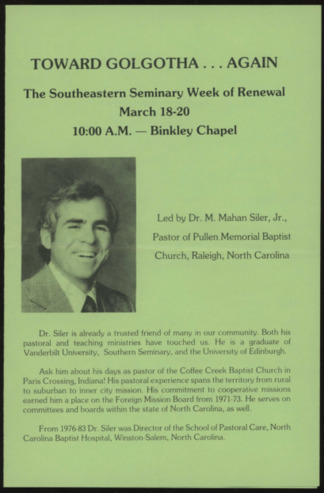Search Constraints
« Previous |
1,631 - 1,640 of 5,071
|
Next »
Search Results

- Description:
- M. Mahan Siler was the pastor at Pullen Memorial Baptist Church in Raleigh, North Carolina. The service begins with organ music (0:00-2:50). The choir sings a song of worship (2:51-4:57). M. Mahan Siler introduces himself as the chapel speaker and the topic of his presentations (4:58-7:58). Psalm 51 is presented through song (7:59-11:37). There is a moment of prayer (11:38-13:24). Siler reads Scripture from Mark 14 (13:25-14:58). Siler shares a personal anecdote to illustrate the importance of giving rather than receiving (14:59-19:38). Siler speaks about how giving can be a way to focus on other’s needs but that actively receiving is also important (19:39-20:33). Siler shares that he hopes by sharing personal things from his life that the congregation will examine their own life and see how God has worked in them to provide grace (20:34-34:00). A song of worship is sung by the choir (34:01-35:50). The service closes with a benediction and a charge (35:51-36:22).
- Subject:
- Grace (Theology) and Christian giving
- Creator:
- Siler, M. Mahan and Southeastern Baptist Theological Seminary
- Location:
- Wake Forest (N.C.)
- Language:
- English
- Date Created:
- March 18, 1986
- Resource type:
- Text and Audio
- Identifier:
- SEBTS_Chapel_M_Mahan_Siler_1986-03-18

- Description:
- Vance Havner was an evangelist from Greensboro, North Carolina. The service beings with a Scripture reading from the Psalms and a moment of prayer (0:00-1:29). Vance Havner is introduced as the chapel speaker (1:30-6:28). Havner speaks about the two greatest perils to churches, which are “getting used to the dark and getting used to the light” (6:29-7:45). Havner speaks about being aware of the darkness that Christians are up against in the world (7:46-16:59). Havner speaks on getting too used to the light, meaning that one can become dulled by the familiarity of the gospel (17:00-28:15). Havner speaks about the response from the congregation to his sermons and the impact he hopes to make (28:16-31:58). The service ends with an announcement to meet Havner and then in a word of prayer (31:59-34:48).
- Subject:
- Church attendance and Light and darkness in the Bible
- Creator:
- Havner, Vance, 1901-1986 and Southeastern Baptist Theological Seminary
- Location:
- Wake Forest (N.C.)
- Language:
- English
- Date Created:
- March 13, 1985
- Resource type:
- Audio
- Identifier:
- SEBTS_Chapel_Vance_Havner_1985-03-13

- Description:
- William Claudius Strickland was one of the five original faculty members of SEBTS. The service begins with “A Mighty Fortress Is Our God” being played on the organ (00:00-02:46). President Randall Lolley gives a word of prayer, he welcomes everyone to Founder’s Day, and he presents Warren Poe and his wife for the presentation of an award (02:47-08:35). Poe present the award to Daniel Stanley (08:36-10:36). William Claudius Strickland is introduced as the Founder’s Day speaker (10:37-13:22). The choir sings the anthem (13:23-16:10). Strickland begins his sermon with a word of prayer, and he reads from six New Testament passages (16:11-23:26). In the first part of his sermon, Strickland tells the story of the German scholar, Eugen Rosenstock-Huessy (23:27-29:42). In the rest of the sermon, Strickland speaks about the incarnation of Christ, the posture of obedience, and the turning away from the decay found in Adam (29:43-52:31). Strickland concludes the sermon with a word of prayer (52:31-52:49). The service ends with organ music and a word of prayer (52:50-54:20).
- Subject:
- Incarnation--History of doctrines, Obedience--Religious aspects--Christianity, and Decay
- Creator:
- Strickland, William Claudius and Southeastern Baptist Theological Seminary
- Location:
- Wake Forest (N.C.)
- Language:
- English
- Date Created:
- March 12, 1985
- Resource type:
- Audio
- Identifier:
- SEBTS_Founders_Day_Address_William_Claudius_Strickland_1985-03-12

- Description:
- John Edward Steely was Professor of Historical Theology. The service begins with organ music and a call to worship (0:00-5:19). The service continues with Scripture readings from Psalm 86 and Galatians 6:1-5 and a word of prayer (5:20-10:02). The choir sings a song of worship (10:03-13:59). Steely speaks about the history of the Galatian church and Paul’s letter to them (14:00-16:57). Steely shares that Paul called the Galatians to fulfil the law of Christ (16:58-19:00). Steely speaks about the commandment to bear one another’s burdens and the practical implications of obeying the commandment (19:01-29:03). Steely concludes the service in a word of prayer (29:04-29:53).
- Subject:
- Galatians, Summary of the Law (Theology), and Bible. Epistles of Paul--Theology
- Creator:
- Steely, John E. and Southeastern Baptist Theological Seminary
- Location:
- Wake Forest (N.C.)
- Language:
- English
- Date Created:
- February 28, 1985
- Resource type:
- Audio
- Identifier:
- SEBTS_Chapel_John_Edward_Steely_1985-02-28

- Description:
- Max Gray Rogers was Professor of Old Testament. C. Michael Hawn was Associate Professor of Church Music. The service begins with organ music (00:00-02:58). The choir sings a song (02:59-03:50). Rogers delivers the Scripture reading from Job 9, and he gives a word of prayer (03:51-07:46). The choir sings the anthem (07:47-12:55). Rogers preaches about the justice of God, and he argues that God seeks to do love rather than seek justice and retribution (12:55-25:05). Rogers ends the service with a word of prayer (25:06-26:04).
- Subject:
- Justice, Administration of, in the Bible, God--Righteousness, and God (Christianity)--Love
- Creator:
- Rogers, Max Gray, 1932-, Hawn, C. Michael, and Southeastern Baptist Theological Seminary
- Location:
- Wake Forest (N.C.)
- Language:
- English
- Date Created:
- February 27, 1985
- Resource type:
- Audio
- Identifier:
- SEBTS_Chapel_Max_Gray_Rogers_and_C_Michael_Hawn_1985-02-27